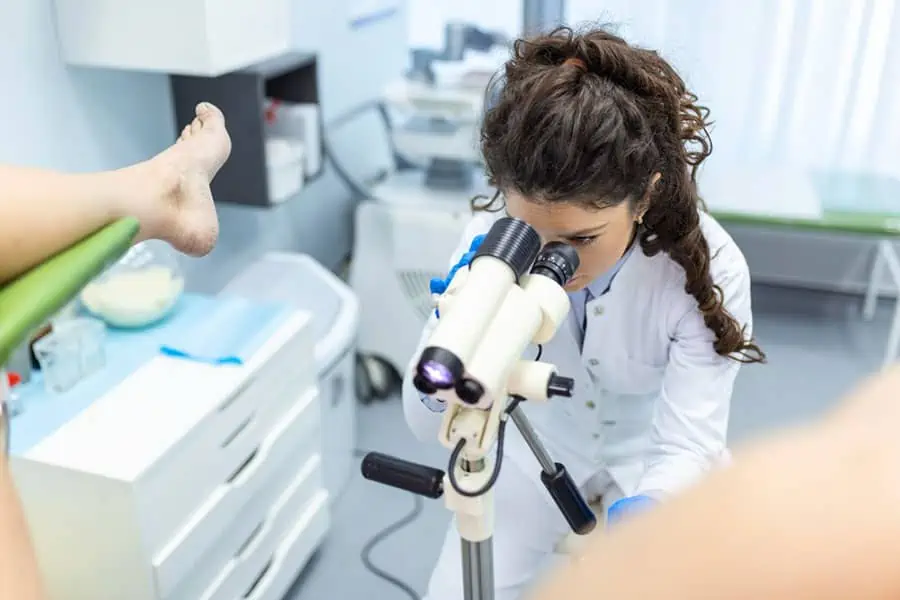Pap Smear Ultimate Guide

In the fight against cervical cancer, Pap smear tests stand as a crucial defense. Developed by Dr. George Papanicolaou, these tests detect abnormal cells and precancerous cells, aiding in the early identification of potential cancerous growth.
Regular Pap smear screenings serve as a critical first defense against cervical cancer, especially for those with HPV infections. A gynecologist performs the test along with a pelvic exam to collect cervical cell samples. Analyzing these cell samples allows early detection of abnormal or precancerous changes. Routine check-ups with your gynecologist for Pap screenings as advised provide crucial insight into preventing cervical cancer through early intervention.
What is a Pap Smear?
A Pap smear, also called a Pap test, is a routine screening procedure designed to detect abnormal cells in the cervix, the lower part of the uterus opening into the vagina. By collecting a small sample of cells from the cervix and examining them under a microscope, Pap smears identify irregularities, including atypical squamous cells, atypical glandular cells, and precancerous or cancerous cells.
The Pap smear's efficacy lies in its ability to detect abnormalities such as squamous intraepithelial lesions and cervical intraepithelial neoplasia, allowing for early intervention and treatment.
Recognized by organizations like the National Cancer Institute and the American Cancer Society, regular Pap smears play a pivotal role in the early detection of cervical cancer, leading to timely preventive measures, treatment, and ultimately, saving lives. Ensuring gynecological health, the Pap smear test remains an essential and life-saving tool, emphasizing the necessity of routine check-ups for women's overall well-being.
Benefits of Early Cervical Cancer Detection
Early cervical cancer detection is crucial for ensuring women's reproductive health and overall well-being. Regular Pap tests, also known as Papanicolaou tests or Pap smears, are instrumental in this process. These screenings can detect abnormal cells on your cervix that may indicate the presence of cervical cancer or precancerous conditions such as squamous cell cancer.
Routine screenings not only help identify normal tests but also detect any changes in cervical cells that may indicate an HPV infection or the presence of abnormal cells. In cases where abnormal tests are identified, our team can recommend further testing, including repeat Pap testing if necessary, to provide comprehensive care for your female reproductive health.
By catching these abnormalities early, healthcare providers can recommend appropriate interventions, which may include repeat Pap tests or further diagnostic tests like an HPV test. The benefits of early cancer screening are manifold, as it allows for timely intervention and treatment, increasing the chances of successful outcomes and ultimately safeguarding the health of women.
The use of an instrument called a speculum during Pap testing ensures a thorough examination, making early detection of cervical cancer a vital component of women's gynecological services.
Can You Get a Pap Smear on Your Period?
Ideally, it is recommended to schedule a Pap smear when you are not menstruating. This is because menstrual blood can interfere with the accuracy of the test results, making it more challenging for healthcare providers to obtain a clear sample of cervical cells. During your period, the presence of blood may obscure abnormal cells, potentially hindering the detection of issues such as adenocarcinoma cells.
For the most precise and reliable results, it's advisable to wait until after your period has concluded before booking a Pap smear. This will ensure that the examination conditions are optimal for the assessment of cervical cells and the identification of any abnormalities or cancer precursors.
However, if you find yourself facing an urgent medical situation or are uncertain about the timing, it's crucial to consult with your healthcare provider. They can offer personalized guidance tailored to your specific circumstances, ensuring that the Pap smear is performed under the most suitable conditions, allowing for the accurate analysis of cervical cells and the detection of any abnormalities, including those of undetermined significance.
Your healthcare provider will work with you to address concerns related to your vaginal walls, vaginal canal, organ transplant, genital warts, and any other relevant factors, ensuring that you receive the best possible care and support for your gynecological health.
Do You Need a Pap Smear if Not Sexually Active?
Yes, it's crucial to understand that Pap smears are not exclusively for sexually active individuals. While the human papillomavirus (HPV), a sexually transmitted infection, is a leading cause of cervical cancer, it's not the only risk factor. Other factors, such as family history, smoking, and a weakened immune system, can contribute to cervical cancer. Moreover, cervical cancer cells can develop in individuals who have never been sexually active.
Regular Pap smears serve as a vital preventive measure for all individuals with a cervix, regardless of their sexual activity status. These screenings help detect abnormal cervical cells early, often before cancer develops, allowing for timely intervention and treatment.
It's essential for everyone, including those who are not sexually active, to undergo routine Pap smears according to their healthcare provider's recommendations. This proactive approach to cervical health ensures early detection of any potential issues, promoting overall well-being and increasing the chances of successful treatment if abnormalities are found.
The Procedure: What to Expect During Your Pap Test
A Pap smear, also known as a Pap test, is a routine procedure that aims to detect any abnormalities in the cervical tissue. It is often referred to as a cervical screening test and is a vital tool in identifying potential health concerns.
During this examination, a healthcare provider will use a speculum to gently access the cervix, which is the lower part of the uterus. They will then collect a sample of cervical cells, including squamous cells of undetermined significance, if present. These cells will be sent for laboratory analysis.
A normal Pap smear is a reassuring result, indicating that no abnormal cells are present. However, if your test shows an abnormal Pap test result, it may suggest a common sexually transmitted infection. In such cases, your healthcare provider may recommend further testing to determine if there is an active HPV infection, as a positive human papillomavirus test can indicate the need for closer monitoring or additional intervention.
It's worth noting that the procedure remains important even if you have had a total hysterectomy, as it can still provide valuable information about your cervical health.
Regular Pap testing
Routine testing is a crucial component of maintaining your reproductive well-being and catching any potential issues early on for prompt and effective management. Your healthcare provider will guide you through the process and provide support to ensure you feel comfortable and informed throughout your Pap test experience.
At All-Inclusive Preventive Care, we prioritize your comfort, confidentiality, and well-being throughout the entire process, ensuring a positive experience during your Pap smear.
Overcoming Pap Smear Anxiety: What to Know
Overcoming Pap smear anxiety is essential for ensuring regular screenings, which are crucial for women's health. Here are some tips to help you overcome Pap smear anxiety:
- Understanding the Procedure
- Open Communication with Healthcare Provider
- Practice Relaxation Techniques
- Bring Support
- Focus on Self-Care

Advanced Technology for Accurate Screening
At All-Inclusive Preventive Care, we are committed to providing the highest quality of care, which includes utilizing advanced technology for and accurate and precise pelvic exam and screenings. Our facility is equipped with state-of-the-art tools and equipment specifically designed for gynecological screenings, including Pap smears.
We employ cutting-edge digital imaging and diagnostic technologies that enhance the accuracy of the Pap smear results while ensuring a more comfortable experience for our patients.
Our advanced screening methods not only improve the efficiency of a Pap test but also enable early detection of abnormalities and potential risks. These technologies allow for detailed analysis of cervical cells, ensuring that even subtle changes are identified promptly.
Cervical Cancer Screening: Beyond the Pap Smear
While the Pap smear is a vital component of cervical cancer screening, there are other methods that complement and enhance its effectiveness in detecting and preventing cervical cancer. One such method is the HPV test, which identifies the presence of high-risk human papillomavirus, a leading cause of most cervical cancers.
HPV Testing and Abnormal Cells
Testing for HPV can be done alone or in conjunction with a Pap smear and provides valuable information about the risk of developing cervical cancer. Integrating HPV testing with a Pap test allows for a more comprehensive assessment, especially for women over 30 when the risk of HPV-related cervical abnormalities is higher.
Additionally, advancements in molecular testing have led to the development of innovative techniques such as liquid-based cytology and biomarker assays. Liquid-based cytology, an improvement upon traditional Pap tests, provides a more detailed analysis of cervical cells, reducing the likelihood of false-negative results.
Biomarker Assays
Biomarker assays, which detect specific proteins associated with cervical cancer, offer a highly sensitive approach to early detection, especially in cases where cellular changes might be subtle.
By embracing these supplementary screening methods alongside a Pap test, healthcare providers can offer a more nuanced and accurate evaluation of cervical health.
This comprehensive approach ensures that potential abnormal pap test results are identified at their earliest stages, empowering individuals and healthcare professionals to make informed decisions about preventive measures and treatments, ultimately reducing the prevalence and impact of cervical cancer.
FAQs: Your Pap Smear Concerns Addressed
Understanding the importance of Pap smears is vital for proactive healthcare. Here, find expert answers to common Pap smear questions.
How Often Do You Need a Pap Smear?
Pap smear frequency varies based on age, sexual activity, and health history. Generally, it's every three years for women starting at 21. Women over 30 may combine Pap tests with HPV tests every five years. Individual circumstances determine the schedule, so consult your healthcare provider for personalized recommendations.
Does a Pap Smear Hurt?
While a Pap test may cause mild discomfort, they shouldn't be painful. Communicate openly with your provider about concerns. They can adjust the procedure and pace, ensuring your comfort. Relaxation techniques like deep breathing can help. Remember, Pap smears are quick, essential tests for early detection of cervical issues, contributing to your overall well-being.
Pap Smear Age: When Should You Start?
A normal Pap test begins at 21, irrespective of sexual activity. Early screening allows for the detection of abnormal cells. Consult your healthcare provider for personalized advice based on your health history and risk factors. Regular screenings are crucial for cervical health; don't hesitate to discuss any concerns with your provider.
Schedule Your Pap Smear: Empowering Your Health Journey
Empower your health journey by taking charge of your well-being. Scheduling your Pap smear at All-Inclusive Preventive Care is a proactive step toward maintaining your cervical health.
Regular screenings play a pivotal role in early detection and prevention, ensuring both your peace of mind and a healthier future. Our team of compassionate and highly skilled healthcare professionals is dedicated to supporting you every step of the way, offering expert care in a comfortable environment. Your well-being is our priority, and we are committed to ensuring that you receive the highest level of care and attention to maintain your gynecological health.
To schedule your Pap smear and prioritize your health, please call us at (305) 200-3141. Don't wait – take control of your health journey today. Request an appointment and invest in your long-term well-being. Remember, your health is your most valuable asset, and at All-Inclusive Preventive Care, we are dedicated to empowering you on your path to a healthier, happier life.
